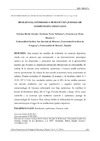Identificador persistente para citar o vincular este elemento:
https://accedacris.ulpgc.es/jspui/handle/10553/12055
| Campo DC | Valor | idioma |
|---|---|---|
| dc.contributor.author | Reche García, Cristina | es |
| dc.contributor.author | Tutte, Verónica | es |
| dc.contributor.author | Ortín Montero, Francisco J. | es |
| dc.date.accessioned | 2014-07-25T02:30:08Z | - |
| dc.date.accessioned | 2018-03-15T14:34:59Z | - |
| dc.date.available | 2014-07-25T02:30:08Z | - |
| dc.date.available | 2018-03-15T14:34:59Z | - |
| dc.date.issued | 2014 | es |
| dc.identifier.issn | 1886-8576 | - |
| dc.identifier.uri | https://accedacris.ulpgc.es/handle/10553/12055 | - |
| dc.description.abstract | Son escasos los estudios de resiliencia en contexto deportivo, siendo este un proceso que corresponde a un funcionamiento psicológico óptimo en los deportistas y representa una característica de la personalidad positiva que favorece su adaptación afrontando eficazmente las adversidades. El análisis de la relación entre resiliencia, optimismo y burnout puede establecer nuevas aportaciones. Es objeto de este estudio caracterizar estos constructos en judokas. Fueron evaluados 45 deportistas (9 mujeres y 36 hombres; edad:M =19.95,DT= 5.34). Los resultados señalan que el 38% de los judokas presenta una elevada resiliencia, con una significativa y negativa relación con sintomatología de burnout, relacionada con bajo optimismo. Se establece la Escala de Resiliencia (Ruíz, De la Vega, Poveda, Rosado y Serpa, 2012) como confiable y se concluye que resiliencia asociada a optimismo protege de sintomatología de burnout. Este trabajo facilita la elaboración de estrategias de intervención para el logro de un rendimiento óptimo deportivo. | es |
| dc.description.abstract | There are few resilience studies in sportive context, being this process corresponds to an optimum psychological performance in athletes and represents a characteristic of the positive personality that favours his adaptation tackled in an efficient way the adversities. The analysis of the resilience, optimism and burnout can establish new contributions. The aim of this study was to describe these constructs in judokas. They were evaluated 45 athletes (9 women and 36 men; age: M = 19.95, SD = 5.34). The results show that 38% of judokas present a high resilience, with a significant and negative relation with symptoms of burnout, related with low optimism. It establishes the Resilience Scale (Ruíz, Of the Vega, Poveda, Rosado and Serpa, 2012) as reliable and concludes that resilience associated to optimism protects of symptoms of burnout. This work facilitates the elaboration of strategies for intervening for the attainment of a sportive optimum performance. | - |
| dc.format | application/pdf | es |
| dc.language | spa | es |
| dc.relation.ispartof | Revista Iberoamericana de Psicologia del Ejercicio y el Deporte | - |
| dc.source | Revista Iberoamericana de Psicología del Ejercicio y el Deporte. Sevilla : Wanceulen, 2006- .-- ISSN 1886-8576. año 2014, vol. 9, n. 2 | es |
| dc.subject | 61 Psicología | es |
| dc.title | Resiliencia, optimismo y burnout en judokas de competición uruguayos | es |
| dc.type | info:eu-repo/semantics/article | es |
| dc.type | Article | es |
| dc.compliance.driver | 1 | es |
| dc.identifier.absysnet | 537108 | es |
| dc.identifier.crisid | -;-;- | - |
| dc.investigacion | Artes y Humanidades | es |
| dc.rights.accessrights | info:eu-repo/semantics/openAccess | es |
| dc.type2 | Artículo | es |
| dc.identifier.ulpgc | Sí | es |
| dc.description.sjr | 0,367 | |
| dc.description.sjrq | Q3 | |
| dc.description.sellofecyt | Sello FECYT | |
| dc.description.esci | ESCI | |
| dc.description.dialnetimpact | 0,0 | |
| dc.description.dialnetq | Q1 | |
| dc.description.erihplus | ERIH PLUS | |
| item.grantfulltext | open | - |
| item.fulltext | Con texto completo | - |
| Colección: | Rev. Iberoam. psicol. ejerc. deporte. 2014. v.9, n.2 Artículos | |
Visitas 10
351
actualizado el 15-ene-2026
Descargas
175
actualizado el 15-ene-2026
Google ScholarTM
Verifica
Comparte
Exporta metadatos
Los elementos en ULPGC accedaCRIS están protegidos por derechos de autor con todos los derechos reservados, a menos que se indique lo contrario.
